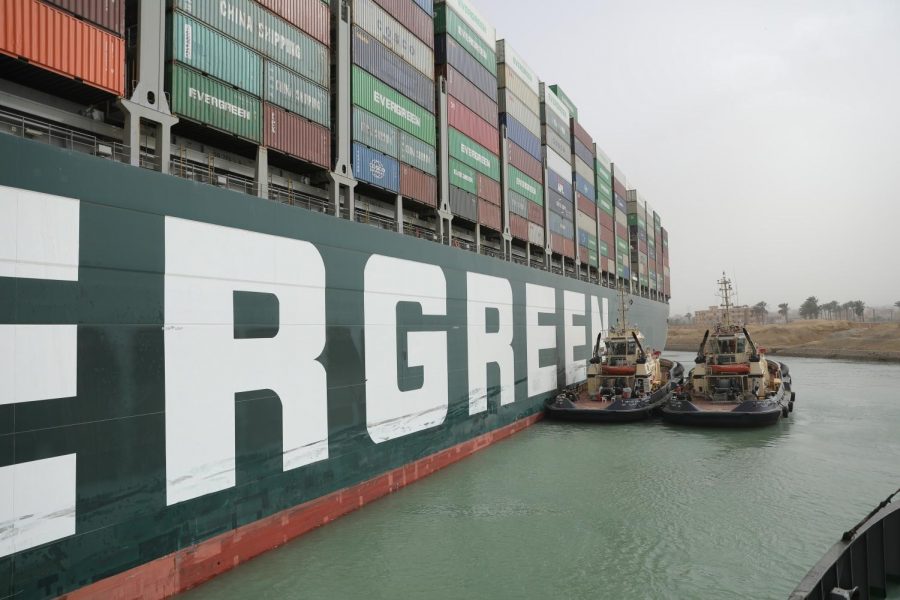On March 23, one dust storm threw the whole world into a panic.
The Ever Given, a container ship measuring 1,312 ft in length, was lodged sideways in the Suez Canal, effectively blocking any and all passage. The Suez Canal connects the Mediterranean and Red Seas,and separates Africa and Asia. It carries huge economic significance as it is the shortest maritime route between Europe and Asia, and around 12% of global trade passes through the canal.
The Suez Canal Authority and a hired Dutch firm worked day and night to free the ship. Tug boats, dredgers and diggers were all called in to assist. Over the course of the six days it took to remove the ship, there was lots of discussion about the ramifications the blockage would have worldwide.
“I think the immediate effects are going to be somewhat limited,” James Lake, Ph.D., an associate professor at Southern Methodist University, said. “Even if it would have gone on for a little bit longer, I think it would have been more of a blip than a sustained impact.”
Lake says that a lot of trade goes through the canal, but even if it lasted a week, he doesn’t think there would be lots of future effects. He said there may be small delays in the delivery of parts and products, but no other large impacts. The long-term effects might have more of an impact, but the short-term effects were very small and were quickly taken care of.
Wookun Kim, Ph.D., an assistant professor at Southern Methodist University noticed that at the beginning of the blockage, oil prices went up a bit because of panic and overbuying, but the prices quickly stabilized after people realized that there wasn’t going to be a major crisis.
Like Lake, Kim thinks that there will most likely be some delays in the delivery and production processes for a few weeks.
“It spills over to other vessels that were in line, and it’s not just going to be those vessels that were directly impacted, but it’s going to have spillovers to those who are behind schedule because of this blockage,” Kim said. “As you can imagine, it is hard to evaluate exactly how much cost this will generate because there will be a lot of downstream effects.”
A common view throughout professionals seems to be that the effects of the canal blockage won’t be concentrated in one part of the supply chain.
“Exactly calculating how much it costs, it’s difficult to say because of a very complicated and intricate supply chain,” Kim said. “It’s not going to be localized, it’s not going to be an event just having an impact on the Egyptian economy or the oil industry, it’s going to have a broad impact across [the supply chain].”
Although the disruption will be spread throughout the supply chain, there are still some thoughts about which industries will be hit the hardest by the blockage.
Jerry Howland, an AP Macroeconomics teacher, thinks that shipping companies will be affected the most. The coronavirus was already hurting shipping companies because of the closing of retail stores and cruise ships.
“A trend we were seeing before the blockage was that a lot of maritime companies were starting to scrap their ships and scrap their fleets because the price of iron and steel had been rising due to China’s infrastructure project,” Howland said.
But shipping companies aren’t the only ones who will be affected. Kim mentioned that the insurance companies of the boats are liable for these kinds of disasters and that this could hurt them.
“The insurance companies have already been hit hard by the pandemic, so on top of that, now they have to pay out whatever they are liable for. It’s going to be a huge impact for them.” Kim said. “The way they make money is charging premium. That’s what they do, but now that they’ve exhausted a lot of these reserves, they would have to raise the premium and it’s going to have an impact on the insurance market as well, because of these disasters.”
Another view that seems to be commonly shared is that the blockage of the Suez Canal will cause companies to reconsider their policies.
“I think it raises the bigger question of how firms organize their supply chains longer term because this is just another example of something that can go wrong,” Lake said. “You’ve had COVID which has done that, and now the closure of the Suez Canal for a while, so . . . I think that is where there can be much longer term and bigger effects.”
Lake mentioned that many companies follow a “just in time” policy, where they keep very little stock on their hands at a time. He thinks that the recent problems in global trade will cause them to reevaluate their structure.
“It really depends on how firms view the frequency of these sorts of events going forward, but I definitely think it’s going to cause them to reevaluate how often these things happen.”
If companies view these disasters as something that will happen often, they might decide to have more stock on hand. If they view these disasters as something rare, they may decide to continue the way they have been.
This reconsideration will also be applied to infrastructure.
“[The ship] is very large and I am not sure what the trend is, but my understanding is that the size and capacity of these vessels are becoming bigger and bigger,” Kim said. “And things like this could happen, the probability of these things happening will go up unless there is good planning and forward looking of infrastructure management. That is something that the policy makers should think about as well.”
This is not the first time that the Suez Canal has been blocked. The canal was blocked for eight years between 1967 and 1975 due to the Six-Day War between Israel and Egypt, Jordan and Syria.
Kim thinks both incidents teach us a lesson: this is the time to build resilience to such disasters.
“I think it could also be a history lesson too. This happened, and this could happen again, and we just saw that this happened not because of war but because of failure of men-constructed objects, which is a vessel,” Kim said. “So with the advancement of technology, there are some things that are maybe lagging behind, and it is a lesson for us and it identifies the areas that we may have to work on as community members.”




